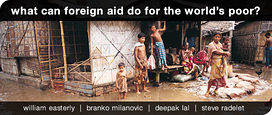The aid debate ends with a whimper; let’s try a bang.
Dr. Radelet seems to have given up trying to make the case that aid raises growth in favor of a heavily hedged statement that aid on some planet sometimes, somewhere does something positive.
Professor Lal and Dr. Milanovic have a conversation on empires, global government, and global welfare systems, which is as fun as it is unrelated to any actual policy debate on aid.
Radelet’s list of recommendations for aid reform reflect the conventional wisdom as refined by countless committees and task forces. Lost somewhere in the muddle is the essential question: can’t we just hold aid agencies accountable for doing something positive and concrete for the poor? I still haven’t heard an answer to the original questions:
Can’t we just hold the agents of charity accountable, so they do get 12-cent medicines to children to keep them dying from malaria, do get $4 bed-nets to the poor to prevent malaria, do get $3 to each new mother to prevent child deaths, do get a preteen Ethipopian girl enslaved to carrying firewood into school?

